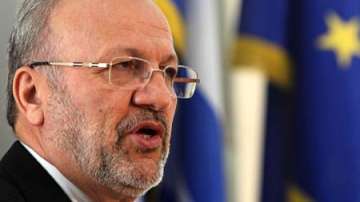Iran's Foreign Minister Sacked
Tehran, Dec 14 : Iran's president abruptly fired his foreign minister on Monday and named the nuclear chief as acting top diplomat, the latest sign of a rift at the top levels of the Islamic

Tehran, Dec 14 : Iran's president abruptly fired his foreign minister on Monday and named the nuclear chief as acting top diplomat, the latest sign of a rift at the top levels of the Islamic theocracy as the country faces intense pressure from the West over its nuclear programme.
President Mahmoud Ahmadinejad gave no explanation for the change in a brief statement on his website. But the fired diplomat, Manouchehr Mottaki, is seen as close to Supreme Leader Ayatollah Ali Khamenei.
And the president may be aiming to install a figure more personally loyal to himself as Tehran resumes critical talks with world powers over the nuclear programme that has brought four rounds of UN sanctions on Iran.
The nuclear chief, Ali Akbar Salehi, is one of Ahmadinejad's 12 vice presidents.
"This move shows not only the internal tensions but the primacy of the nuclear issue as Iran's main foreign policy objective," said Rasool Nafisi, an expert on Iranian affairs at Strayer University in Virginia.
Just a week before the shake-up, Iran resumed negotiations with six world powers over its suspect nuclear programme after a long hiatus and another round is planned for early next year. Four sets of UN sanctions appear to be biting into the Iranian economy and Ahmadinejad may be looking for a loyal foreign minister who will help him clinch a deal with the six powers to ease the punitive measures.
A fourth round of sanctions was imposed in June over Iran's refusal to halt uranium enrichment, a key part of its nuclear programme that is of international concern because it can be used both for making reactor fuel and atomic weapons.
Iran insists its aims are entirely peaceful, but the UN's International Atomic Energy Agency says its years of investigating have not been able to confirm that.
The sanctions are making it more difficult for Iran to trade with the outside world.
The president of Iran's chamber of commerce, Mohammad Nahavandian, said last month that import prices for most goods have risen by 15 to 30 per cent because of sanctions. That is because companies, particularly Asian firms, are bumping up prices because they know Iran is now a desperate market and insurance is difficult -- if not impossible -- to obtain on shipments to Iran.
And many European firms avoid dealings with Iran or their banks refrain from transactions with Iran.
Some of the tensions between Ahmadinejad and Mottaki have spilled out into public in this closely guarded nation.
In the past year, Mottaki opposed a decision by Ahmadinejad to appoint his own special foreign envoys to key areas such as the Middle East, Afghanistan and the Caspian Sea region. Mottaki found the appointments embarrassing to the foreign ministry and allegedly took his complaint to the supreme leader, who has the final say on all state matters and runs the nuclear programme. AP
President Mahmoud Ahmadinejad gave no explanation for the change in a brief statement on his website. But the fired diplomat, Manouchehr Mottaki, is seen as close to Supreme Leader Ayatollah Ali Khamenei.
And the president may be aiming to install a figure more personally loyal to himself as Tehran resumes critical talks with world powers over the nuclear programme that has brought four rounds of UN sanctions on Iran.
The nuclear chief, Ali Akbar Salehi, is one of Ahmadinejad's 12 vice presidents.
"This move shows not only the internal tensions but the primacy of the nuclear issue as Iran's main foreign policy objective," said Rasool Nafisi, an expert on Iranian affairs at Strayer University in Virginia.
Just a week before the shake-up, Iran resumed negotiations with six world powers over its suspect nuclear programme after a long hiatus and another round is planned for early next year. Four sets of UN sanctions appear to be biting into the Iranian economy and Ahmadinejad may be looking for a loyal foreign minister who will help him clinch a deal with the six powers to ease the punitive measures.
A fourth round of sanctions was imposed in June over Iran's refusal to halt uranium enrichment, a key part of its nuclear programme that is of international concern because it can be used both for making reactor fuel and atomic weapons.
Iran insists its aims are entirely peaceful, but the UN's International Atomic Energy Agency says its years of investigating have not been able to confirm that.
The sanctions are making it more difficult for Iran to trade with the outside world.
The president of Iran's chamber of commerce, Mohammad Nahavandian, said last month that import prices for most goods have risen by 15 to 30 per cent because of sanctions. That is because companies, particularly Asian firms, are bumping up prices because they know Iran is now a desperate market and insurance is difficult -- if not impossible -- to obtain on shipments to Iran.
And many European firms avoid dealings with Iran or their banks refrain from transactions with Iran.
Some of the tensions between Ahmadinejad and Mottaki have spilled out into public in this closely guarded nation.
In the past year, Mottaki opposed a decision by Ahmadinejad to appoint his own special foreign envoys to key areas such as the Middle East, Afghanistan and the Caspian Sea region. Mottaki found the appointments embarrassing to the foreign ministry and allegedly took his complaint to the supreme leader, who has the final say on all state matters and runs the nuclear programme. AP